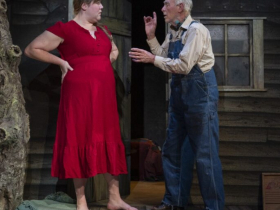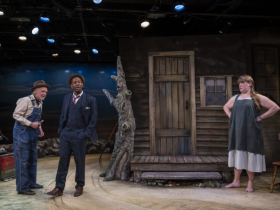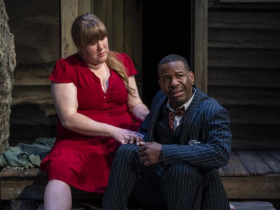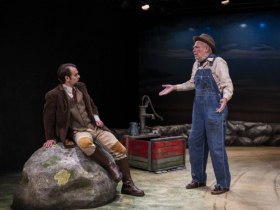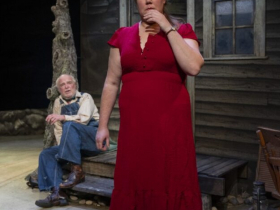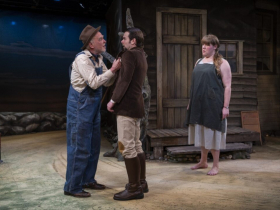Acting Shines In ‘Moon For Misbegotten’
Chamber Theatre cast makes O'Neill's classic American play come alive.
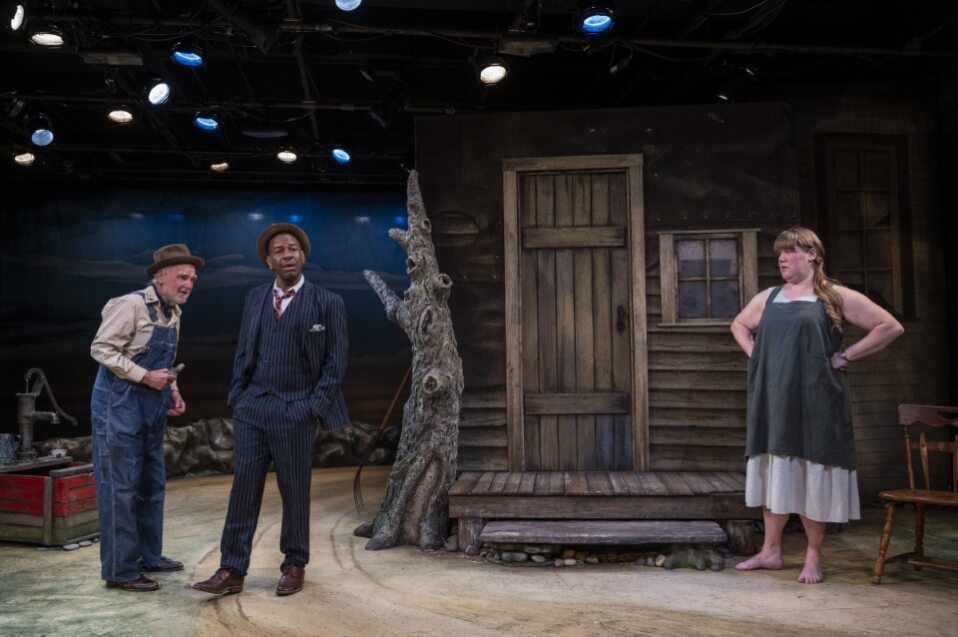
Milwaukee Chamber Theatre presents Moon for the Misbegotten at Studio Theatre through February 4. Photo by Michael Brosilow.
Eugene O’Neill is readily acknowledged as one of America’s master playwrights, but his works like Long Day’s Journey Into Night are less staged than those of other masters. Their darkness in situation and family characters has something to with this, as does their volubility (poetic language, extended dialogue), plus hard-drinking ensembles on the fringes of society. Every major O’Neill play is something of an acting challenge.
The Milwaukee Chamber Theatre is rectifying that absence at the Studio Theatre through February 4. It has assembled an experienced cast for O’Neill’s final 1940s masterpiece, Moon for the Misbegotten, not staged here in decades but acclaimed for how it tests actors while upending stage expectations about romance in a rural setting.
Here constantly scheming pig rancher Phil Hogan scares off his sons with his rages. He is in turn tamed by the physical size and rough ways of his daughter Josie, while trying to wrangle a romance and financial reward for her from his alcoholic landlord James Tyrone Jr. (an O’Neill character pickup from Long Day’s Journey).
The machinations are wrapped in broad Irish brogue, one of the delights and the dilemmas of this long piece. There’s an old theater joke that Irish playwrights always fall in love with their own language and the actors are condemned to find their way through it, sometimes to notable career-making effect. O’Neill, a pioneer in realism and exposing hard truths in long dialogue, is a wonderful and painful example.
This notable proven cast, under director Mary MacDonald Kerr and dialect couch Raeleen McMillion, pitches the Irish moan low and the conversation high to near perfection – with no desire to trim or evade the depths. O’Neill seldom writes a short encounter and his characters extend their feelings and characters in repetitive words and jests. There are compelling moments of theater within, but there are also no built-in rest stops.
So it requires someone like Jim Pickering, a Milwaukee stage landmark. He sets cranky old Phil loose at a high physical and vocal energy, relentlessly blistering, snarling and conniving. The acting decision was made to let the audience as well as the other characters figure out on their own when Phil is plotting a flimflam or revealing a true thought. There is no stop or much pause in this marathon performance.
Then there is another fine actor, La Shawn Banks as Jim Tyrone. Slouching and contorting amiably at first as Jim slides in and out in various fogs, he really cuts loose in the second act, exposing Jim as a tortured alcoholic with humanity and insight within his troubled mind. Like so many characters in O’Neill’s pantheon, we are constantly re-evaluating his methods and his place in the story. The actor forces us to look at the silences as well as the outbursts.
But the play mainly relies on its Josie, who must both frighten and endear us in her bulk and pretense to be a fallen woman. With a stick in one hand to scare off her tormenters and a good bourbon in the other hand to carry out her plans, Josie is a remarkable stage creation, unlike most romantic roles on the stage. As the program notes make clear, Kelly Doherty – more familiar to audiences as a dominating villain or comic interlude — has found the role of her life. Particularly in making her vocal skills dominate the physicality that has often been her stock in trade.
Her hard Irish sounds and manner bend again and again into dove-soft deep brogue as Josie shifts from angry victim of schemes to comforting lover and earth mother. This is a special performance, though it also exposes the repetition of situations and meanings that O’Neill has built into the play.
In small but important roles, A.J. Magoon and Zach Thomas Woods have impressive moments. The constant sound of crickets is the main enhancement of technical effects.
Both the strength of the play and its difficulty stem from the same love of language that Irish playwrights seem to have in abundance.
The play runs through February 4th at Milwaukee Chamber Theatre; buy tickets here.
Dominique Paul Noth served for decades as film and drama critic, later senior editor for features at the Milwaukee Journal. You’ll find his blogs here and here.
Photos
If you think stories like this are important, become a member of Urban Milwaukee and help support real, independent journalism. Plus you get some cool added benefits.

